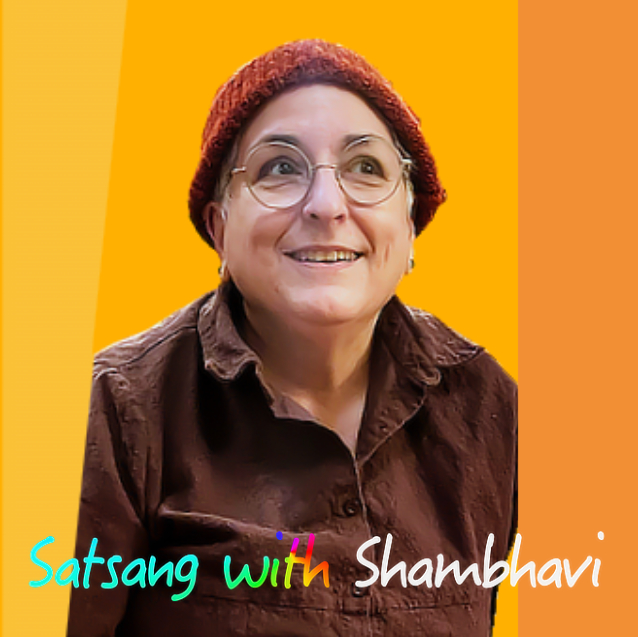Earth, water, fire, air, and space are expressive powers. Compassion is part of the fabric of reality. And earnestness is boring. A podcast from Satsang with Shambhavi
STUDENT 1
Can you talk about more subtle elements and then how they're connected to the gross material realm?
SHAMBHAVI
Sure. Well, when I was much, much younger and before I had any training in Ayurveda, I actually started going to get Chinese medical treatment fairly young. I think even before I ever had a spiritual practice.
And I remember there was some loose talk of the five elements [laughs] when I went to those appointments. And I remember having a very skeptical attitude like yeah, right, everything's made out of earth, water, fire, air or whatever. Right. I mean, look around, it's not. [laughter]
This is me at like 24. Right. [laughs] But later when I received actual teachings on the five elements, I realized that they are intelligences. So they are expressions of Shakti and of the intelligence of Shakti. So each element is a huge category of self-expressions.
So water element does include literal water. But if we look at actual water, say in a stream or a river, what do we see? We see something whose power resides in adaptability.
So we can say that the intelligence-infused shakti of water element, that big category of experiential possibilities to learn about the power of adaptability. And then also to learn about and experience what happens when one isn't adaptable. Or when something isn't adaptable.
Right. So then we can look at stagnant water. And out of just that simple quality that we observe from natural water, then we can experience a whole range of phenomenon in our life as part of the continuum of that expression of adaptability-to-stagnancy continuum.
Including in our relationships, in our sinks, in our toilets. [laughs] Right, everywhere. So everywhere we can observe this principle of the experiential possibilities of adaptability on a continuum with stuckness.
And that is part of the intelligence of what we call water element. Or the creative expressiveness of water element. And it just reproduces itself in so many places in life.
So then we can keep looking at this hypothetical creek or river. And we can see that everything in it is flowing and connected. So when water flows naturally, it has a smoothness and that flow is continuous. Everything in the river is connected to everything else.
So we can look at this intelligence. This expression of connectedness and continuity and flow. And we can see how these principles of continuity and flow are reproduced in so many aspects of our life.
In literal water, but not only in literal water. So we're talking right now, there's some kind of continuity and flow happening. But if suddenly one of us got their knickers in a twist and got really quiet and withdrew, then we'd have discontinuity.
So that would be water element expressing continuity on a continuum from total continuity, smoothness, and flowiness to disconnection, jerkiness, dryness, not working-ness. Right. Bad relationships over here, really nice relationships over here. [laughs]
The best way to say it is that these elements are giant categories of expressive capacities, of Ma Shakti. And we can look at each of the literal elements and see inherent within them qualities that you can extrapolate across pretty much your whole life.
So what about fire?
STUDENT 2
There's like this destructive quality to it, but like also it's like clearing things out. Like making space for something new to come. And so it's like vibrant and lively, powerful, and expressive.
SHAMBHAVI
Luminous? So all of those are expressive capacities. Being able to express luminosity, being able to express destruction and its transformative power. For instance, cooking with fire, it doesn't destroy necessarily, but it transforms one thing into another.
Or it transforms a group of things into something that's different than just the sum of their parts. So we can extrapolate that across all of our lives. So think of them as giant bundles of expressive capacity, or expressive powers.
STUDENT 3
How do we know our heart is opening? Sometimes I experience it, because I see myself just letting go of what I really want to say and really just offering my understanding that this is where that person is. And that's ok. Is that the heart opening up and compassion building, or is that just me keeping my mouth shut?
SHAMBHAVI
Well, that would depend on the circumstance. If it's very painful for you to keep your mouth shut, and you go over and over in your mind what you wish you had said, then I would say it's not compassion. [laughter]
Everything expresses both in an unlimited and a limited form. There's no break between your experience of compassion, which might involve some thinking and some effort to sort of let go of something and get back into your heart.
Those are all limited expressions of compassion. But they are connected in this continuum, unbroken continuum with totally-enlightened compassion. So totally-enlightened compassion.
This is something probably the most important thing that I ever received from Anandamayi Ma, was this transmission of compassion in a very particular way. Where it was made apparent to me that these wisdoms, like compassion, are actually the foundation of our existence.
That they are built into reality. They are everywhere. So compassion is like part of the stuff of existence. So we can't make it more. We can't cultivate it. We don't own it. But we can have a more or less natural and spontaneous relationship to it.
So let's say somewhere on the less spontaneous side would be you're really mad at somebody, they've done something you don't like. But you're struggling to be open-hearted to them.
So you have a very long conversation with yourself about, they're just human, too, and they're this, too. And plus, you should feel this and you should feel that. And eventually you sort of eke out a little feeling of compassion towards them. [laughter]
So that's good. But we shouldn't get too attached to that because that is not our destination. Our destination is not to have a better thought process around compassion.
Our destination is to be so relaxed that none of these thoughts are actually happening. And compassion is just moving out. It's just happening on its own, spontaneously, without us doing anything to affect it or shape it or control it.
I don't know if everyone can feel this. Because I think in a certain way in order to feel this you really have to give up a lot of your stances and your positions.
But there's a point that you get to, I guess. A kind of a tipping point in your life as a human and a practitioner, where you sense. You feel just that relief and beauty. And how much you just long to just give it all up and let this compassion come out.
So there's sort of a tipping point when we move from not even wanting to experience the full flow of these wisdom virtues, because we have all these concepts about right and wrong.
And who's deserving and who's not. And who's lovable and who's not. And who earned our compassion and who didn't. And who's too horrible to even deserve any compassion.
You know, we have all these concepts and we're very righteous about them and they are naturalized. They're naturalized within our diverse cultures where there's all these ideas about ourselves and other people. And who's deserving and who's not. And who should get punished and who should get rewarded.
And those things for a long time in our human life, unless we're very lucky and we just are born not buying into this. But for most of us, for a long time in our human life this just seems normal and natural. And why would we even want to not feel this way, right? [laughs]
But it would be just so weird not to feel this way. But eventually we do feel how much effort is going into this absolutely exhausting effort of dividing everybody up into all these categories. And holding back this absolute river or ocean of wisdom.
It just becomes completely exhausting. And then we start praying to be relieved of these constrictions. And let this come out in whatever way it does. So understand that your efforts are on a continuum and that's good.
There's no separation from God there. But there's a long way to go before you're just like, ahh, it's going to come out however it comes out. In the Bhagavad Gita, Krishna says "every word of the realized yogi is a mantra."
And I think that's true also when our heart is—it's not really open or closed—it's just when we have more access to the wisdom of the heart, or less. And when that access is more full, then everything that we do has that quality of compassion.
Whether it's gentle or fierce, or coming or going, whatever it is. We don't have to worry about it so much anymore. Very often people worry, am I being compassionate? Or am I being mean? I don't even know if I'm being compassionate or mean. [laughter]
We have these questions. But after some time, maybe lifetimes, who knows? We just have this confidence, trust, whatever you want to call it. That whatever it is that's coming out is doing some good for somebody. And we don't have to worry about it anymore.
STUDENT 4
I've been thinking a lot about the quote you posted recently in wisdom words from Ma, that says nothing has happened.
SHAMBHAVI
If you can understand that nothing has happened, it is a great blessing. It's something like that.
STUDENT 4
And at the end she talks about, you know, it's a blessing to have that inner sight. What did she mean by that, the inner sight?
SHAMBHAVI
She means pratyaksha darshana. Direct seeing, direct knowing. I mean, inner, outer doesn't really matter. But whoever she was talking to, it was inner. It is also the wisdom of the heart. The wisdom of the equality of all phenomenon. It's the same thing.
Everything is purna brahmha narayani. Everything is full of this aliveness and awareness. And everything is made of that. Then on some level, everything has total equality. On that level, nothing is happening because everything is an experience that is being produced within the body of the Lord.
It's like, it's not happening in an objective, absolute way. That objectivity, or that experience of objectivity is happening within the subjectivity. So it's like a dream. Although it's not dreamlike particularly.
But it's like a dream in the sense that there's real sensation happening. And there's real adventures. And there's emotions happening. And vision is happening. And hearing is happening. Experiences are happening.
Dreams are real experiences, but they are not an objective reality. And it's the same here. These are real experiences, but they're actually, you know, just like in a dream.
You don't wake up and go, oh my God, I murdered someone in my dream. It was so awful. I'm so worried about that guy. We have the understanding that the dream is made out of awareness and energy, right?
Patterns of awareness and energy. Guess what? Everything here is also made out of patterns of awareness and energy. [laughs] So we have all the feelings, we have all the caring, we have all the adventures, we have all the sensory experiences.
But there is no objective reality. There's only subjective reality. What it means is not that nothing is happening in a literal sense. It means that nothing is happening the way we think it's happening. In other words, there is no objective reality. There are not really people in worlds here.
As Ma said to Atmananda once, she was talking about something, what do you think about all these horrible things happening in the world? Atmananda asked Ma. And Ma just turned to her and said, what worlds? [laughs]
STUDENT 5
How does it help, to think that nothing's happening?
SHAMBHAVI
Nothing's happening the way we think it's happening? Well, for one thing, it cuts back on earnestness. It's a medicine for our attachments. And when we become less earnestly attached to our concepts of self and other, then we have more freedom to express ourselves and we're more skillful.
STUDENT 5
A little bit of distance to observe our experiences.
SHAMBHAVI
I'm going to tell you this story. It's about the woman who discovered that RNA affected DNA. So when Watson and Crick didn't discover the double helix structure, when their lab assistant Rosalind did, and they didn't give her credit.
So when that happened, they devised this theory called the master molecule theory. So not only did they steal their lab assistant's work, but they named what they discovered the master molecule. [laughs]
And that said that DNA directed and was in charge of everything in the body. Nothing ever affected DNA. Nothing could speak back to DNA. DNA, it was a one-way communication, baby.
So she discovered something called reverse transcriptase, which is kind of a chemical process whereby RNA actually does reorder the base pairs in DNA. And where DNA is, like, shown to be basically not all that it's cracked up to be.
And the whole master molecule thing that I learned when I was in college, just went right down the toilet. So she didn't use an electron microscope. She worked with, I think corn.
And apparently corn has really big DNA, and really big RNA in the cells. And she used some kind of microscope, but it wasn't an electron microscope. And she basically looked into it.
And her own self-description was that she became part of the cell. And she was, like, walking around inside of it and discovering things. That was her self-description of how she worked.
She also described, interestingly enough, this kind of experience that could have been related to kundalini. She described how she would get a certain charge of energy in her spine. And then she would run for hours and hours without getting tired. So there was something happening there in her energetic system that was giving her this really immersive experience.
I studied history of science and technology when I was in graduate school. And there's a wonderful biography of this woman, by a woman historian of science at Harvard. It's just a wonderful, wonderful story.
Anyway, it's that sense of immersion rather than witnessing. So it's not that you're not seeing. You're seeing, but you're not stepping back. You're going into. And there's a kind of magicalness to the going into things, rather than stepping out.
STUDENT 5
I guess the things I'd like to step back from are my heated emotions.
SHAMBHAVI
Sure.
STUDENT 5
I don't really want to go. I want to step back and say.
SHAMBHAVI
Well, don't step back and say anything, invoke some sadhana. Change the energy directly. I mean, you can do whatever you want. Of course, there are traditions where what you're talking about would be absolutely what it's about.
Step back. Apply reason. Apply the view. Apply the teachings in a certain kind of intellectual way to give yourself some distance. That is the method in some other traditions. That just isn't a major method in this tradition.
So what we would say is that you're overheating. Emotions are made of energy. And that what you should do is redirect that energy. Redirect your attention. Redirect the energy. Using sadhana, not using an intellectual, like talking yourself out of something.
Sign up to receive email updates
Enter your name and email address below and I'll send you periodic updates about the podcast.


